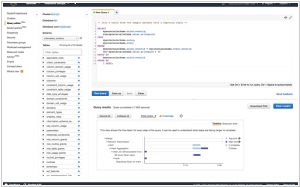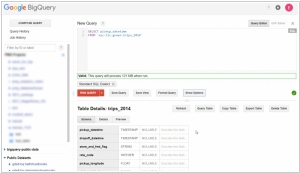Amazon Redshift vs Google BigQuery
May 18, 2023 | Author: Michael Stromann
12

Amazon Redshift is a fast, fully managed, petabyte-scale data warehouse service that makes it simple and cost-effective to efficiently analyze all your data using your existing business intelligence tools. You can start small for just $0.25 per hour with no commitments or upfront costs and scale to a petabyte or more for $1,000 per terabyte per year, less than a tenth of most other data warehousing solutions.
See also:
Top 10 Big Data platforms
Top 10 Big Data platforms
Amazon Redshift and Google BigQuery are both cloud-based data warehousing solutions, but they have some key differences in terms of architecture, pricing model, and integration capabilities.
One major difference is their underlying architecture. Amazon Redshift is built on a columnar storage model, which makes it highly efficient for analytical queries on large datasets. It uses a massively parallel processing (MPP) architecture and offers features like distribution styles and sort keys to optimize query performance. On the other hand, Google BigQuery utilizes a serverless computing model and a distributed storage system called Capacitor, which allows for automatic scaling and processing of queries in parallel across multiple nodes.
Pricing models also differ between the two. Amazon Redshift follows a pay-as-you-go model, where users are charged based on the amount of data stored and the compute resources utilized. In contrast, Google BigQuery uses a model based on the amount of data processed, which means users pay for the amount of data scanned during query execution.
Integration capabilities are another distinguishing factor. Amazon Redshift integrates seamlessly with other Amazon Web Services (AWS) products and services, such as Amazon S3 for data storage and AWS Glue for data cataloging and ETL (Extract, Transform, Load) processes. It also supports integration with various third-party tools and frameworks. Google BigQuery, on the other hand, integrates well with the broader Google Cloud ecosystem, including Google Cloud Storage, Dataflow, and Data Studio. It also offers connectors for popular data integration tools and frameworks.
See also: Top 10 Big Data platforms
One major difference is their underlying architecture. Amazon Redshift is built on a columnar storage model, which makes it highly efficient for analytical queries on large datasets. It uses a massively parallel processing (MPP) architecture and offers features like distribution styles and sort keys to optimize query performance. On the other hand, Google BigQuery utilizes a serverless computing model and a distributed storage system called Capacitor, which allows for automatic scaling and processing of queries in parallel across multiple nodes.
Pricing models also differ between the two. Amazon Redshift follows a pay-as-you-go model, where users are charged based on the amount of data stored and the compute resources utilized. In contrast, Google BigQuery uses a model based on the amount of data processed, which means users pay for the amount of data scanned during query execution.
Integration capabilities are another distinguishing factor. Amazon Redshift integrates seamlessly with other Amazon Web Services (AWS) products and services, such as Amazon S3 for data storage and AWS Glue for data cataloging and ETL (Extract, Transform, Load) processes. It also supports integration with various third-party tools and frameworks. Google BigQuery, on the other hand, integrates well with the broader Google Cloud ecosystem, including Google Cloud Storage, Dataflow, and Data Studio. It also offers connectors for popular data integration tools and frameworks.
See also: Top 10 Big Data platforms




